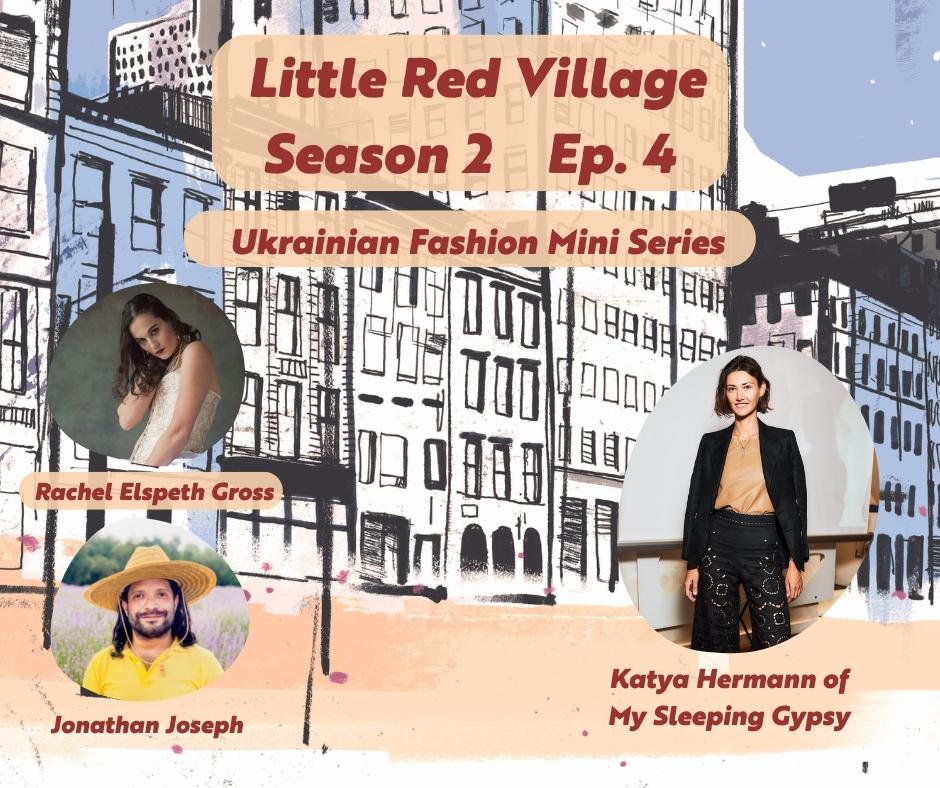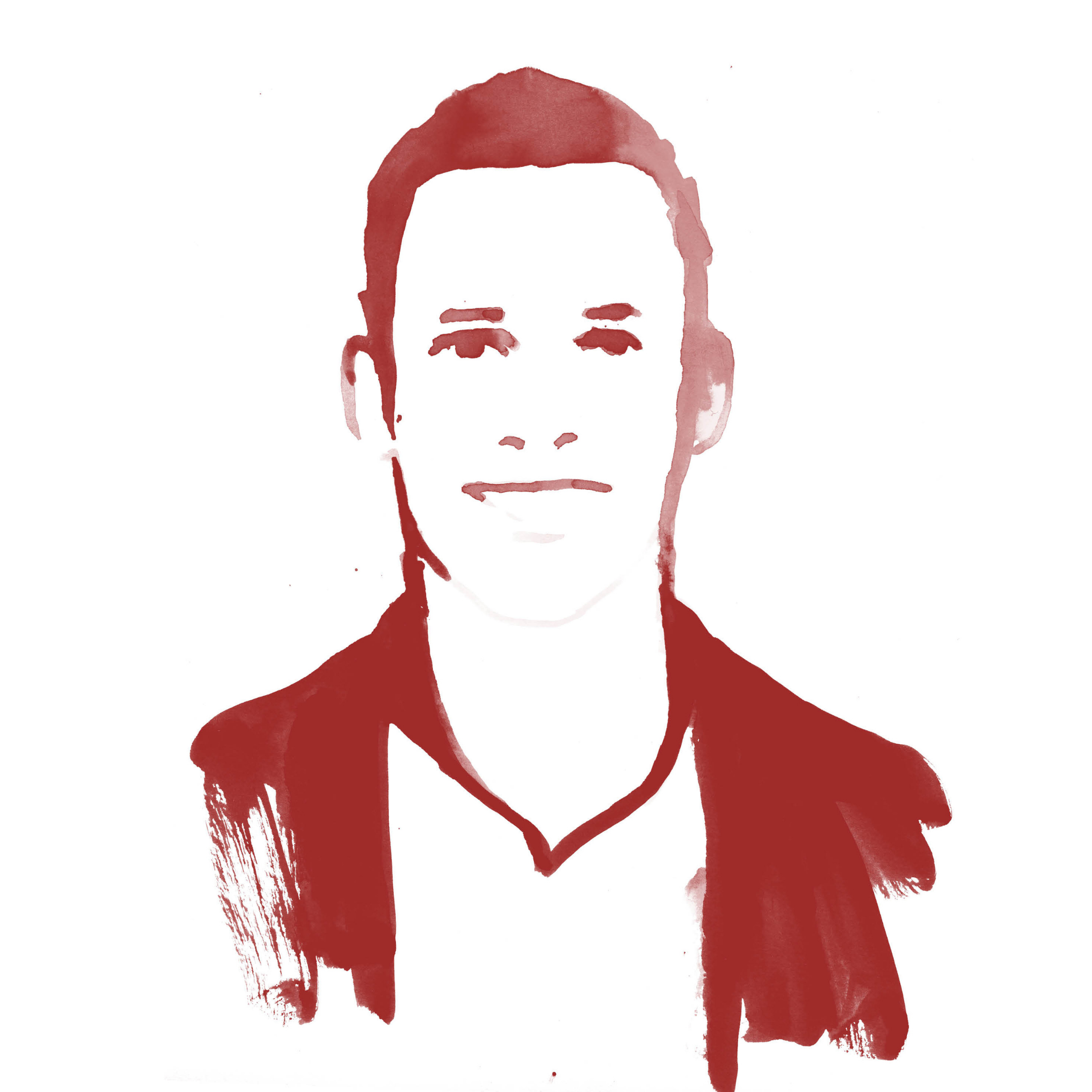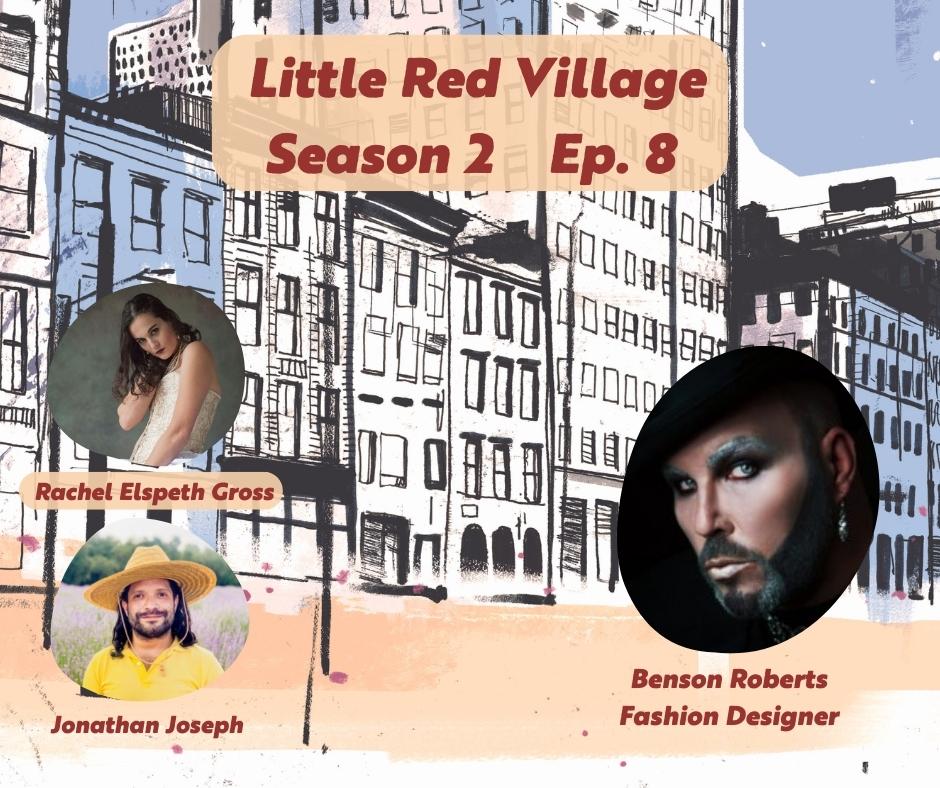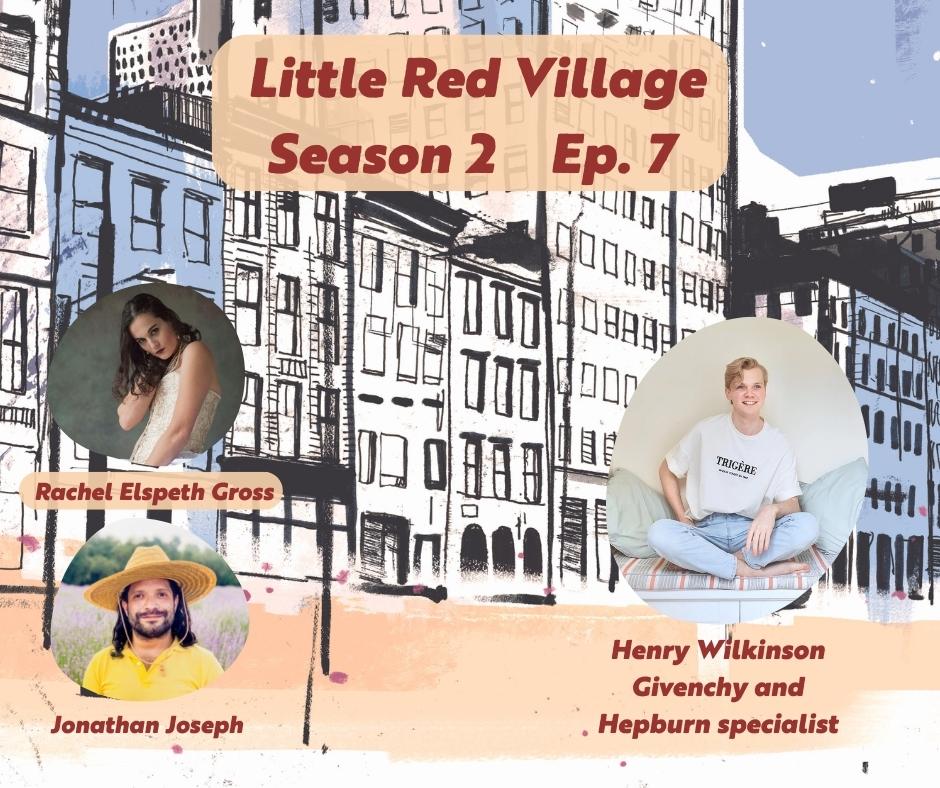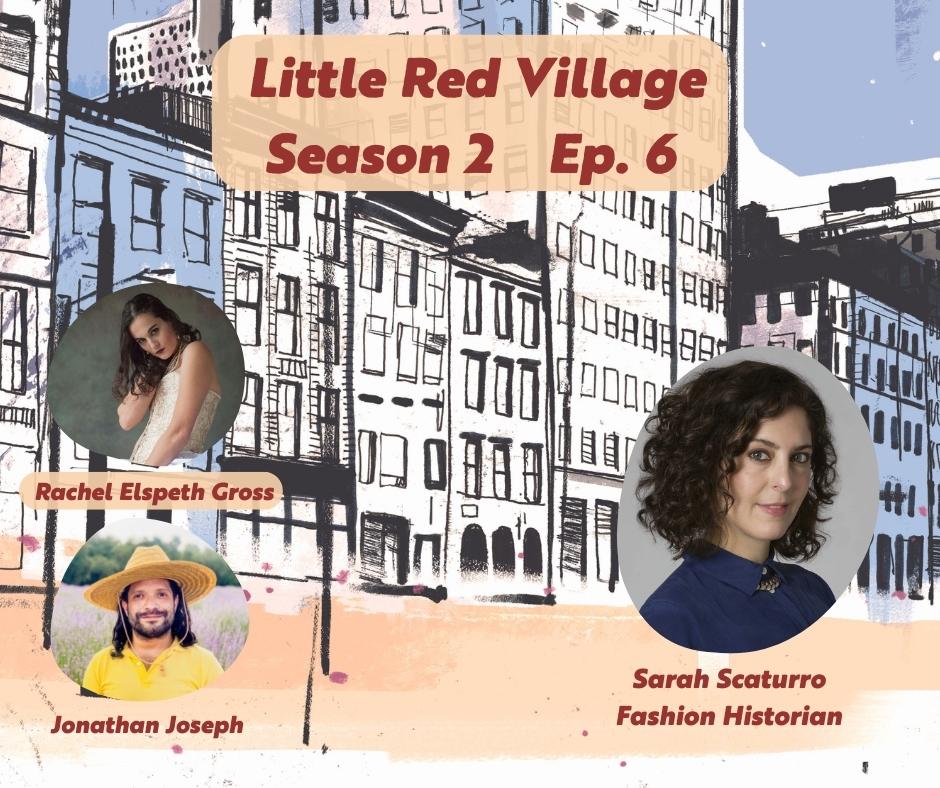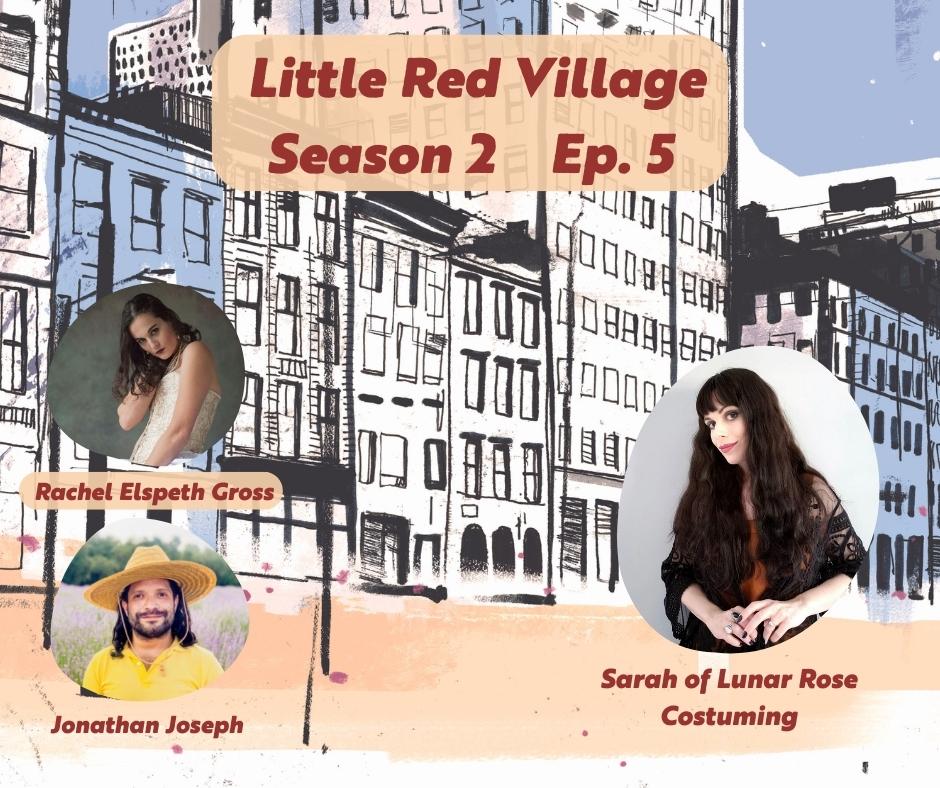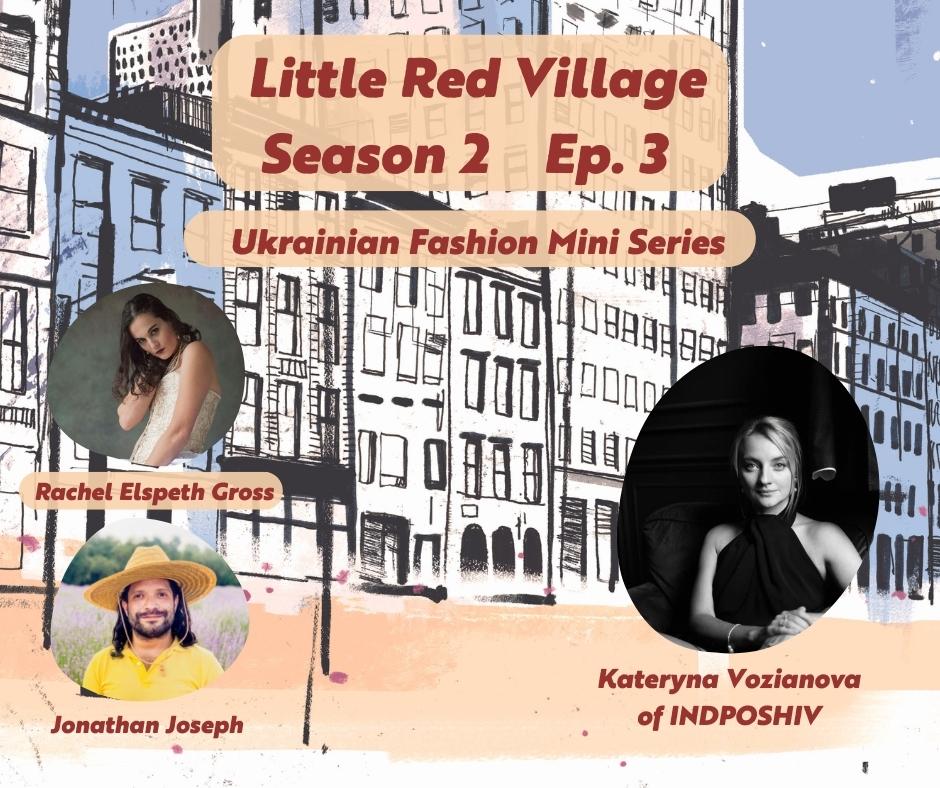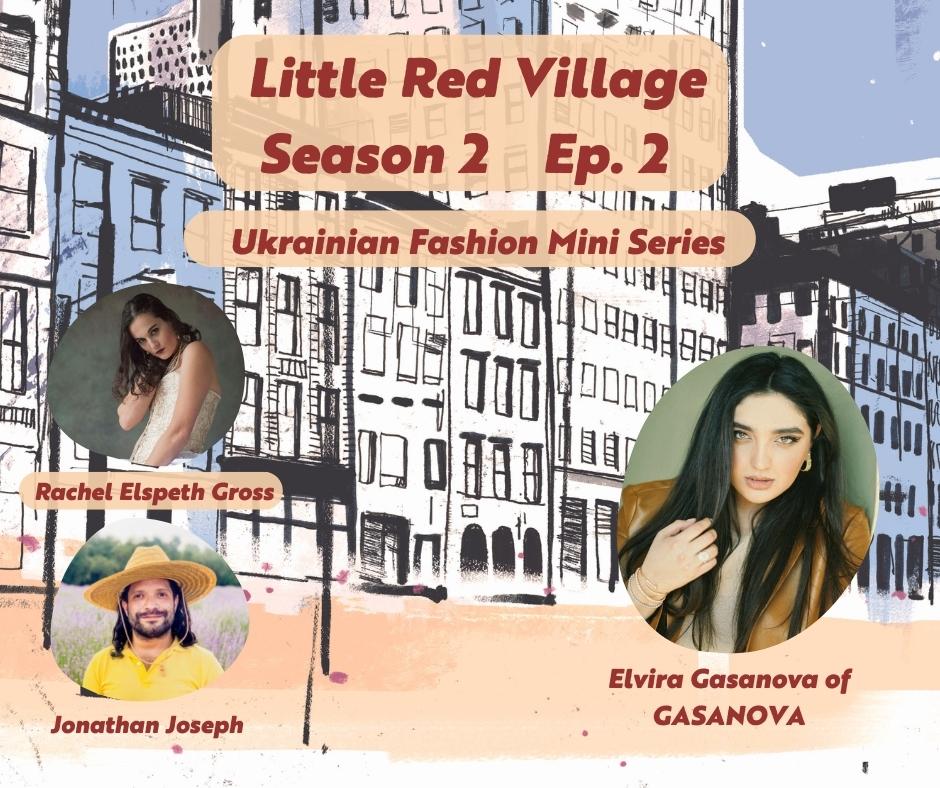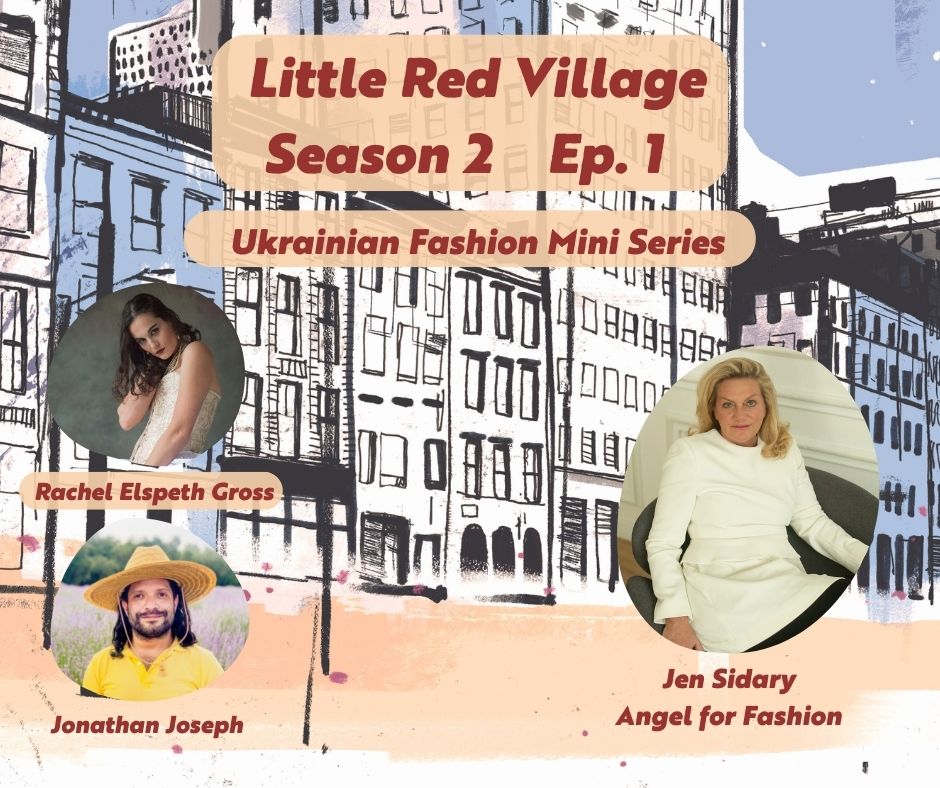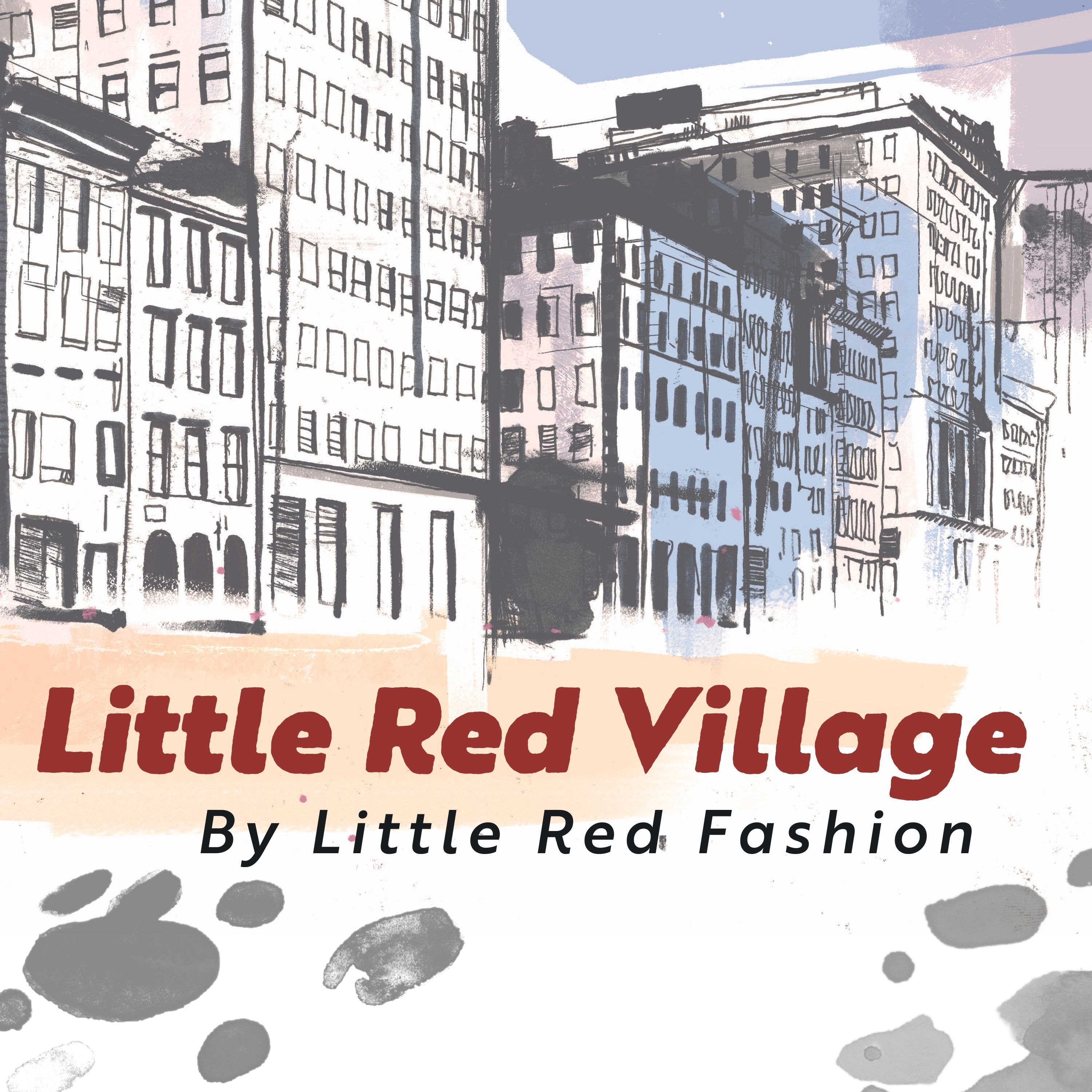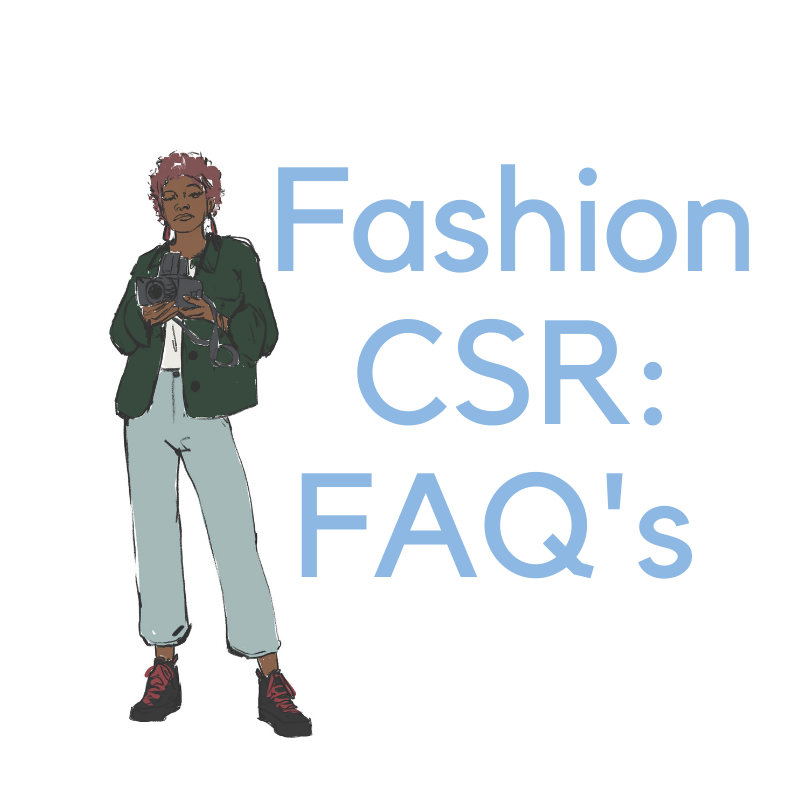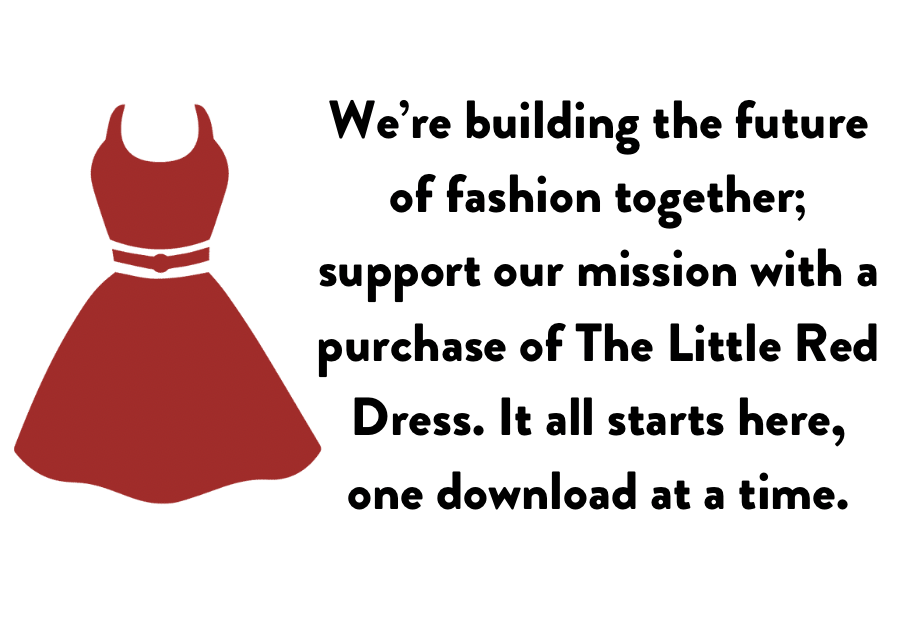Season 2 Ep. 4
Links to listen
Links to all other podcast platforms can be found here.
Speakers
Rachel Elspeth Gross (Host)
Jonathan Joseph (Host)
Katya Hermann (Guest)
Rachel Elspeth Gross 00:00
You might read the brand name my Sleeping Gypsy, and be immediately turned off because of the use of a word which is widely accepted to be a slur or pejorative. After speaking frankly with Katya Herman, one of the brand's six founding female members and their creative director, I can tell you that the name and the lady's dedication to keeping is far more nuanced than might be expected. In a conversation about her current refugee status and the terrifying journey to get her 47 employees and their families to safety. Katya made time to explain to me where the name comes from, what it means the women who created the company, one of whom has over money to send, and why they have chosen to stick by it, even though it has cost them opportunities. The six founders vote on every decision the brand makes, and they are dedicated to the work and the people who work for them. In this conversation, I learned that when Ukraine was invaded for the second time, back in February, it felt like a surprise to a lot of people. There was no perception of animosity between Ukrainian and Russian citizens. And some people refuse to believe that it could actually come to war. Once the invasion began, Katya, who wasn't good time, and one of her co founders immediately found transportation and work to get their workers and the workers families to safety. It was not simple, but it's a story she relates in this interview gently, and with a lot of grace, before they were forced to scatter for safety. And yes, the lady still have digital meetings wherever they can. My Sleeping Gypsy, which is named for the already rich so painting from 1897 was building a sustainable high fashion movement, limiting production, refusing to keep stock or have inflated prices just to later offer fake discounts. These women are still working some of them countries apart for the conceivable future. That's maybe what I hope you take away from this. The utter tenacity, the depth and range of this woman and her partners who are fighting to reestablish their cultural heritage in every conceivable way. Before I met Katya, I never imagined that a woman displaced could be such a beacon of unfailing strength. And now, I think that was small with me. Hey, everybody, this is Rachel here with another episode of our Little Red Village podcast. And today with me, I have Katya Herman, who's one of five founders, all female of my Sleeping Gypsy, and very sadly, she's currently a refugee, and she's staying close to Geneva, with one of her partners, and you guys are working through this for must be very intense. And I can't tell you how much we appreciate you making some time to talk to me today.
Katya Hermann 03:01
Hello, everyone. And thank you very much, Rachel, for this invitation. So that's a chance for us to speak about what we are going through to share our experience with all the people that we know, we feel that people all over the world. They're supporting us. And they're thinking about Ukraine. So yeah, this opportunity is very valuable for me, as you have said, Indeed, I'm currently near Geneva in one of these very nice little villages like medieval villages. And now I live in amazing house since recently, since a couple of weeks before that, within the brand we've been leaving altogether, remember, in our young ages, so there was people sleeping in the corridors, like everywhere. But when we think of college I've been here for around two months, maybe a bit less than two months when the war since the outbreak of war in Ukraine. I've moved to here because one of our partners in business, Angela, she lives here for the last 10 years. She we've been operating the business within Ukraine, and then she was here. So I would usually come to her you know, we're like four or five of us we're very connected and very close to each other. So we share all the family stories and stuff even though we're all different have different ages and different social backgrounds, and even different cultures and countries right. But I think that's what makes it the democratic board of the brand.
Rachel Elspeth Gross 04:22
Email I love that. Very much like a woman's love that.
Katya Hermann 04:26
Yeah. And so I came here is we've agreed with Angela to Angela, have found the vehicle. The war started we were all devastated. We couldn't imagine this will be actually a month before the outbreak of war. Angela will be calling us and me I was I just returned to Kyiv from my travels and she was saying okay, there's gonna be war guys. We have to move out. We have to take out the production because we're vertically integrated. We have seven people, facilities, everything so there's a big structure, but I have to admit we will Absolutely not prepared. We couldn't, couldn't accept the idea that there's going to be any war with Russia, you know, Russian and Ukrainian people that brought the nations definitely they share so many similarities. In between people. There was no hatred, no war, and no one could ever imagine that the massive violence like that will be started by the Russian current government against Ukrainian nation and Ukrainian people.
Rachel Elspeth Gross 05:27
Were you born in Ukraine?
05:29
Yeah, I was born in Ukraine. So I was born in USSR in the city called Lugansk, which is in Donbas, maybe some of you have heard well Donbas. So basically, I'm being a refugee a bit, I call it normal. I'm a normal, that's my lifestyle. So maybe that's why I'm navigating the refugee art of refugee quite well, in my hometown, Donbas, but I left Lugansk stand where I was born when I was, I think, 12. Since then, I've lived in different countries and visited many countries, but my family, my grandmother and grandfather would remain there. So when, in 2014, all this started on Donbass and Crimea, we were only back then involved in towards the war is for my family. That was the first of all, and now yeah, that's, again, more violence, which was absolutely unpredictable for us, even though our foreign friends and you know, in Kyiv, we have a residence where I resided, and it was within the brand. So it was a beautiful 200 square meters, space in the center of key if we're on the first floor, we would have the r&d department and the second floor, I would leave and our art director. So the people would always be coming to the residence to exchange, you know, communicate with the brand. And so we still keep this facility in Ukraine. Now in kyiv if our team who stayed in key if they gathered there, and there was a period in time when people were hiding, because this is a historical building. So we expected that they will not be destroying historical heritage, this building is more than 100 years old, beautiful building. So
Rachel Elspeth Gross 07:06
Gosh. I mean, it makes makes me think of the Second World War. I mean, it makes, you know, I know that a lot of people were encouraged to leave if they were not, you know, able to help in the military. And one question I've been asking people like you is, traditionally the workforce is female, right? Like the people piecing together the clothing. And I keep hearing over and over that women are choosing to stay because they want to they want to do their work. And I wanted to ask a little bit about your team, such as this say, could you tell me about them?
07:46
Sure. So when the war started, I was in Spain, I left 10 days before the war started since we could not believe that and we were unprepared, as well. So I was in Spain with my kid, we left on vacation to visit our friends, which means that I left Ukraine three weeks ago with a bag for vacations, right a little luggage and I've never returned since then. Then another partner of ours, I will start with the partners of ours. She lives in Russia. So she is still in Russia and is for now she can see how to go out of Russia. There's a place that suspended in the area where she leaves, but she will come here so she still can she has to do the visas to go to the European Union, Russian people need visas. So there's a lot of trouble for people in Russia who do not support the Putin regime that dissidents basically so Ukrainian people suffer physical violence. Lots of Russian people suffer mental violence and displacement. So they don't support this idea they have to leave the country and based on the non official statistics to the official statistically, is that 10 million refugees fled Ukraine. 4 million refugees fled that 4 million Russian people left. Yeah, so one partners of ours is still in Russia, Angela, and other partners. She was here near Geneva and I went to her in order to start picking up our people when the war started. So we were all in absolute shock. We have never operated our brand during the war. We didn't know what war logistics what it means. So as I have found drives for a vehicle, we have taken a vehicle we've said in the car and we've arranged all these logistical operation to get out first 12 People of ours from the border. So then within Ukraine, we've put our people the seven people in two different locations. We get them in two points physically where they live together in the houses where there was the underground where they could hide in cases fire. That was the main problem. So there was the house we call it when there's an airplane bombing.
Rachel Elspeth Gross 09:53
Like an air raid siren like that?
09:57
Yeah, yeah, like a siren. Exactly. So there's a signal for people to go Go into the bomb shelters. And Kyiv I think that the last walkies have witnessed if we don't take my done, which was not a war there was a revolt of Ukrainian people from other parts of history. So there was a during the Second World War, so there's not so many bomb shelters that have been prepared to host people. So we will hide on the parkways or the old parking spots. Sorry. So like, yeah, and that was just shocking. So,
Rachel Elspeth Gross 10:24
on your Instagram, I know for the brand, and we'll put a link to that. I know there's a few posts about this journey about train. And yeah.
Katya Hermann 10:33
we will follow in this stage of every member of My Sleeping Gypsy on the phone. So for my managers, it was a lot of talking, talking, talking, I was trying to talk at least to all 5 daily, twice a day three times a day with people who've been in Kyiv if this first day. So it was two partners of mine, that Tiana and Anastasia. For them, it was very difficult. People were in shock. And it was difficult to convince even them to go out because they have kids and families and you know, dependents so the Deana, for example, she had the grandma of a mother of her husband, an old grandma, she was not working anymore. So she was in her bed all the time. And she needed to be constantly catered. They couldn't commit to go without because of this woman whom they couldn't leave because she she would have been dead alone. And no one could go there and help. So actually, they they left when she died. She died eventually alone in her apartment, but they could come and arrange. Actually Tatiana she lived before and her husband and followed once he arranged a funeral for her mom. But so it was I mean, you know, there's so many stories but and I think Ukrainians now they are very strong in terms of talking about that stuff. You know, in the beginning, we were like, we just couldn't accept we couldn't discuss that we'd like we were like there's going to stop tomorrow there's going to stop like no one could see this as a continuous action. And of course, no one could imagine like, well, we know already now three months into the game. But the first state was shocked. So we've located people in the safest place we could possibly arrange in Kyiv. And then we started to take them out, in some sense, one by one. So we were organizing people in the groups. And then we took this vehicle and we came to the border, we brought the humanitarian aid. So the local people we had so much support, I'm so grateful to the people of Geneva and this part of France that is very close to here. And all these people, they have donated so many things, we've put them in the car, we brought it to Slovenian border, we took out the humanitarian aid, and we took in our employees and refugees basically feeding the war. So there were our team members. And with some of them, they were the kids and the families, all women first car was all women. And then we came here to Geneva and we were located in Angela's house, this partner of ours, she gave all the house, you know, house, the everywhere, it was people, you know, old neighbors, they brought in mattresses and help and they will come in every day to bring dinner, you know, because we were suddenly 25 people straight. And there was the whole operation to just feed these people for Angela who've never also, you know, had that many people.
Rachel Elspeth Gross 13:19
Yeah, that would be a lot in normal circumstances.
Katya Hermann 13:22
Yeah, Yeah And then we started to where we voted. So it was difficult to convince people to go out because everyone was waiting that the war is gonna stop any day, then people started to feel very compassionate. And you know, they wanted to be of help while volunteering. So we've created MSG (My Sleeping Gypsy) support initiatives. So you know, to keep paying people you know, who are not specifically in the garment production now, but they're doing all these things. So we started to come up with ideas of how we can help locally. So that's what we been balancing since then. taking people out who want to go out and who is willing, who is ready to join us here otherwise supporting our people. Now they are back to work. The production is operational and key. If however, there's six of them, we were like, hesitated in between solutions, either we should go to the Western Ukraine. But now there's a big chance that Moldova could be taken over. There's instability in the Transnistria region. So does it make sense to go to the Western Ukraine in this to move the production that's the whole operation and everything is stuck in key if so, with this committed to that and we voted within the brand, everyone voted, they people said that they want to stay in key if it's easier for them now is the families that are also there. So I would say now the team is spread to 30%. Here with me in Europe around 10% are in the Western Ukraine. This, for example, our partner of mine and she is the head of operations. So she walks online she she's fine with doing that online. So she is there. So are the people are there, and we can't now provide them work in western Ukraine. So it has to be solved. Either they join us here or they go back to key if that's really big drama, actually.
Rachel Elspeth Gross 15:12
Yeah, I'm sure I'm sure the logistics of all of this sounds like a nightmare. Yeah. And
Katya Hermann 15:18
then they the biggest body of the team is in here for the production that became operational one month ago. And since today's fully operational,
Rachel Elspeth Gross 15:27
fantastic. So could we talk about the name of your company? Like how you guys settled? Like, first of all six ladies being able to pick one name I commend? Could you talk about what it means and where it comes from? In the United States? The word gypsy? It's sort of, I don't know, it's it's a difficult concept. And then I just wanted to know.
Katya Hermann 15:48
we haven't actually so our name is a bit also our mission now because you know, a lot of people stand against a Romani people who are sometimes called gypsy. And actually, once we've applied for participation in the award, the Landers Sustainability Award as the Landers is big German retailer and so we were there in the process and inside of the process, we were denied participation due to our name. So as the whole thing because the Gypsy see that is either that's cultural appropriation, or whatever the Gypsys. But actually, so we've investigated this question quite deeply. And I'm sure I've been no. To Yeah, to say that we're proud of our name. It's actually our name comes from, so there's a painting of Henri Rousseau, which is called the boogey man and the homie which is translated in English as Sleeping Gypsy. This painting is by the way in MoMA Museum in New York. Beautiful painting, there's a woman in a dress and the lion next to her. So in French, the Gypsy is bohemian out of our style. So we craft we work with the Ukrainian traditional craft of vyshyvanka, the embroidered dress, but feeling
Rachel Elspeth Gross 16:57
I love them. Oh my god, they'res o beautiful, especially that brail line, oh my god.
Katya Hermann 17:01
Thank you know, the feeling of the feet. And the brand is very bohemian, who are their Bahamians, and why actually in French, Bohemian and gypsy is you know, in some sense the same because the Romani people are considered to be moving from so who are the money people this is the cost from India, of you know, who were musicians and entertainers. And, you know, there's people who are moving all the time, this lifestyle is the way the way they have chosen to lead. So these people apparently at some point in time, they moved from Bohemia, in Czech Republic towards Paris, and it was just actually during the events of the World War Two, and they were looking for the places the cheap places to save is they haven't gotten a lot of money. Never been a nonconformist, and not accepted in any society is difficult to make money when you are this way. And so they were looking for a place to stay in Paris and who is also a nonconformist, and who doesn't have a lot of money. Artists actually, shortly go into the same places and living together in Paris and this actually even happened to be central. So this you know, Boho style, what is boho style, this Nonconformist, so you are your clothes can be a bit shabby, right? You don't care much for the rules, right? So you live your own sort of thing, your own lifestyle, right? And this, this where the connection comes from. So this, this explanation to our name, that it comes from Henri Rousseau's painting and the Bohemian way of life and the memo of being free you know, inside in your thoughts in your heart, and the nonconformity very important now because my belief is that what happens in Russia is also due to conformity the people don't stand up they don't say what they think they're scared is fear. So yeah, not being afraid to be different and to be just the way you are so the brand was called in the beginning Sleeping Gypsy then my appeared in two years, I think, or three years again, the team voted because we felt like we've been gypsy belongs to the plains enough, and we will so and once we've started to sell online and with the website, you know, sometimes we will be full on Russa which I found personally wrong. This is you know, culture that belongs to everyone. Everyone sees this amazing painting. So we thought okay, we and we always for some reason, we always called ourselves my Sleeping Gypsy. So then we've changed the name officially to my Sleeping Gypsy, and that's how, that's how it all came together. And I think the brand is a lot of germs of gypsies, there's no Gypsies in the brand. However, one of our partners said she has in her ancestry. She has gypsy roots, she even research that this is not the family that she's now connected to. But there's there's that which we're also very happy about. But the name comes mainly I would say Yeah, from this non-country warmist nomadic in some sense, lifestyle, if we can send bohemian boho style, which is very much with the feeling of the cost of whatever clothes we create.
Katya Hermann 19:16
I think people forget maybe that Bohemia was a country. I don't know how like, if you ask the everyday person in America, I'm just thinking that might not be something. Yeah. And I mean, I understand what you're saying historically, I also see parallels between what's happening right now. I mean, like you were talking about Russian citizens who are forced to leave, Romanians who are forced to leave who, being a refugee, I mean, I do understand that there is a pejorative and it can be considered an ethnic slur, but I don't, I don't know it doesn't. For me, it seems like you are living with the word means. And that makes sense to kind of own that. I don't know if that's not offensive to anyone.
Katya Hermann 20:53
We may research on the subject of cultural appropriation. So actually, cultural appropriation is a social idea that doesn't have much ground, because what means appropriation is that you take the resource of someone, and if you are taking a there's less of this resource for someone else. That since we use that word, in our name, there's more people talking about gypsy remaining people. And actually, many people like to be talks about the culture is a never ending resource. The more you talk about things that this culture broadens, and it still remains Romani culture, you know, they don't have lessor of that. So this this in terms of cultural appropriation, where I think we are clear on that word, I think, that we've been thinking about, Okay, should we be using the word gypsy? Is it sort of a slur? Or what is this? What what is that? What is a slurred? Are there any words that are bad, like, either people give that meaning to something that it is bad, you know, gypsy people, there's nothing like bad and good in the world, right? So right Romani people, these are the people who are nomads, you know. So in India, for example, I can give you the whole historical information on that, I don't know if you if you want to take it there. But it's, for me, just protecting of people who are being the minority, and who are being neglected and abused. I think that's in some sense, for me, the mission of my life, these people are, you know, always refugees, anywhere, anywhere they go, it's difficult for them to stand on their feet. And now, you know, we see now 50 million refugees, you know, 150 million refugees, use official statistics in the next decades to come due to climate change. So this is a big question, you know, so there's no chauvinism between people, you know, they don't separate people, as there's, these are good people. And there's bad people. I think it's all about people being united, regardless of which country they belong to which passport they hold. It's a question of people evolving into accepting each other. You know, we are all brothers and sisters, we are all people of the world. And as we not ask now, Ukrainian we see that very unexpected events can occur in different countries. I mean, right. So I think people move in together and supporting each other and accepting each other. That's how the humanity can move forward, and actually pay attention to the problems that we are facing the external problems, you know, that we're facing as the human race, not the only particular, you know, politician wars and war conflicts and problems that people create between themselves, they have to unite they shouldn't be separated, because there are the problems of how we're going to survive. One of which is climate change. What do we do about that?
Rachel Elspeth Gross 23:47
Well, I really, really like the idea that, I mean, I firmly believe in having conversations, I think they, they have to happen. And if we ignore things, we don't fix them. Right? The problems persists. So I think that you're right, and that just having a controversial name means that people are being talked about, right. Like, that's important. That's very important for them. Yeah, we have to have these difficult, whatever. So I have one last question for you.
Katya Hermann 24:13
That's hopefully this is just one last thing you know, for. Also, for the Lando, the German company, there was, there was a genocide against gypsy people, romantic justice, Jewish people, there's a special word I'm sorry, I forgot the special word, how it's called. And so the fact that we were denied participation in their Sustainability Award, due to the sake that this word was present in our name, it actually just means that German people don't want its PR you know, it's they don't want to touch the base, you know, to shame society because people don't want to rise important questions of inclusivity of everyone and how do we solve it all together? So, definitely, for us, that's the name we love. And we will always you know, be called this way.
Rachel Elspeth Gross 24:58
No, I very much I appreciate you being willing to explain and talk about it. Because I think we have talked about stuff when it's hard. And I think it's important for us to so I very much, that means a lot. The last thing I want to ask and hopefully this is a little more fun and less sad. I'm very curious. In the United States, children are almost never taught to sew like, I have a five year old daughter and I'm in the process of teaching her to sew because I know how to sew my mom taught me, do you know how to sew? Did you learn as a child? Do you have like a memory about that?
Katya Hermann 25:31
Two parts of fabric together in my stick way. So I can sort of attach things together. But I cannot construct the garment. I'm not a professional seamstress. Definitely. No pottery is parts and make a note Taylor with 20 years. Of course, that's probably the you know, we are all different. And she is the tailor behind the brand, you know, and then any other artists of ours and craftsmen of whom I'm very proud. But of course, no, I mean, me, I wouldn't be able to create my sleeve garment. Definitely not. But I hope I can inspire I can create the space for you.
Rachel Elspeth Gross 26:12
Yes, no. And I don't mean to shame you on that. I just know sometimes people have something in their childhood and, you know, just make them chase down the career.
Katya Hermann 26:20
We've been doing the master classes online on our Instagram, teaching people inviting our friends who are not from our industry, it's just a local influences, you know, cool people that we'd like, we ask them to embroider things and store things together.
Rachel Elspeth Gross 26:38
Sounds wonderful!
Katya Hermann 26:39
Useful skill to learn, especially now. Sometimes it comes down it grounds you, you're grounded when you do it.
Rachel Elspeth Gross 26:46
Yeah. Well, thank you so much for taking the time to speak with me. I really, truly appreciate this so much. And yeah, this is, I know that you're doing so many things. You're wearing so many hats and doing so many jobs. So thank you for making the space to talk to us. It's very important to our Little Red Fashion, and me personally, that we we share these stories, these stories need to be shared. So thank you.
Katya Hermann 27:10
Thank you very much, Rachel, that was a pleasure to talk to you. And yeah. To all the American people for their support, and that taking a big role in that conflict for Ukraine. That means a lot. So yeah, it's about stop anytime made stop now, which is this very second
Rachel Elspeth Gross 27:30
I mean, yes, this moment, this moment, please do. So. Thank you everyone so much for joining us today as we sort of Katya from my Sleeping Gypsy about her experiences and how her brand is going and doing and making and creating right now, cardio. I really appreciate you taking the time and talking about the difficult stuff with us. Thank you very much.
